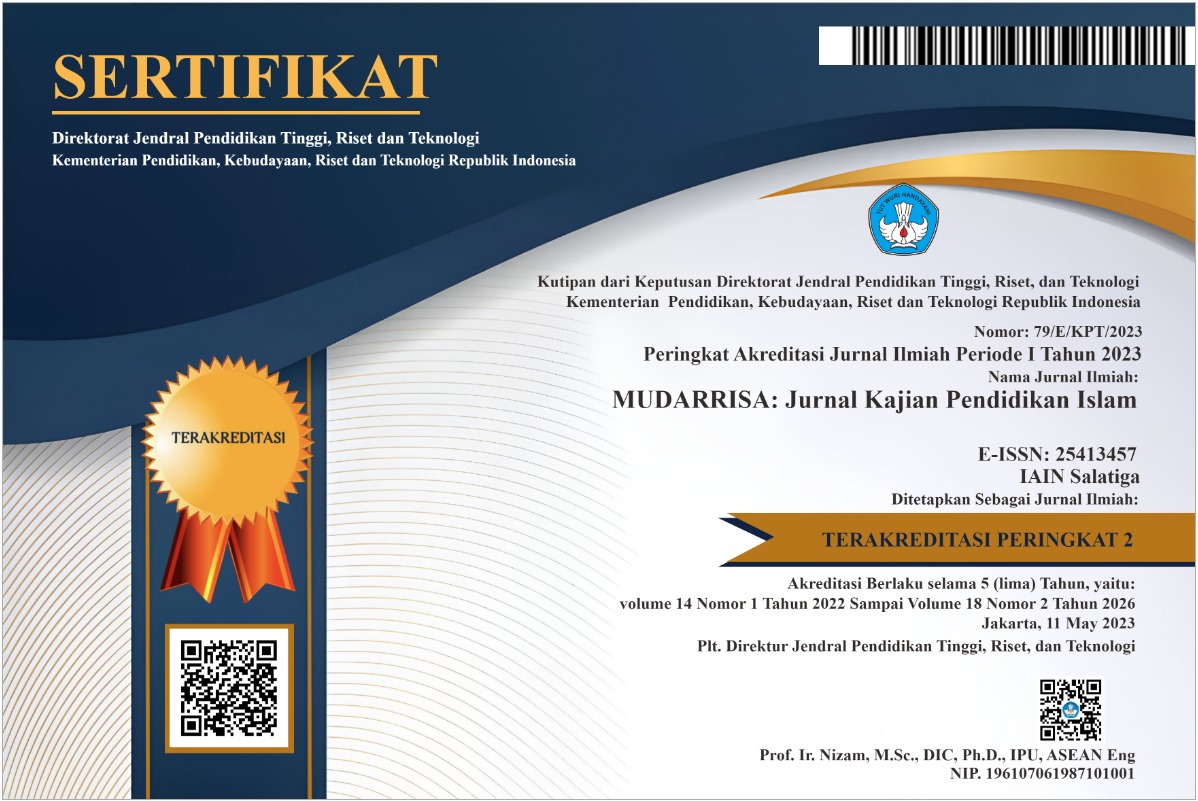The Correlation between Self-Efficacy Levels and Pedagogical Content Knowledge among Madrasah Ibtidaiyah Teachers
DOI:
https://doi.org/10.18326/mudarrisa.v16i2.2088Keywords:
pedagogy content knowledge, self-efficacy, madrasah ibtidaiyah teachersAbstract
This study examines the relationship between self-efficacy in geometry and Pedagogical Content Knowledge (PCK) among Madrasah Ibtidaiyah teachers in Banyumas Regency. Self-efficacy was assessed in 79 sampled teachers using a multidimensional teaching self-efficacy scale focused on effectiveness and classroom management, while PCK was evaluated through tasks involving the perimeter and area of two-dimensional shapes. The findings reveal a weak correlation between self-efficacy and PCK, indicating limited interdependence. This highlights the need to address gaps in both areas. Within an Islamic context, the study emphasizes the relevance of tazkiyah (self-purification) and ilm (knowledge acquisition) as principles of teacher development. It recommends targeted training aligned with Islamic values to simultaneously enhance self-efficacy and PCK. Such an integrated approach aims to improve teaching skills, foster holistic growth, and create a nurturing learning environment that benefits both teachers and students.
References
Agresti, Alan. (2018). Statistical methods for the social sciences (5th ed.). Pearson.
Alhaib, E., & Kadhem Alsandi, A. (2022). The Concept of Morals and Education in Imam Al-Ghazali’s Thought. Science Frontiers, 3(1), 48–55. https://doi.org/10.11648/j.sf.20220301.17
Barni, D., Danioni, F., & Benevene, P. (2019). Teachers’ Self-Efficacy: The Role of Personal Values and Motivations for Teaching. Frontiers in Psychology, 10. https://doi.org/10.3389/FPSYG.2019.01645
Berg, D. A. G., Ingram, N., Asil, M., Ward, J., & Smith, J. K. (2024). Self-efficacy in teaching mathematics and the use of effective pedagogical practices in New Zealand primary schools. Journal of Mathematics Teacher Education, 1–21. https://doi.org/10.1007/S10857-024-09623-9
Berry, A., Depaepe, F., & Van Driel, J. (2016). Pedagogical Content Knowledge in Teacher Education. International Handbook of Teacher Education: Volume 1, 347–386. https://doi.org/10.1007/978-981-10-0366-0_9
Emiru, E. K., & Gedefaw, M. T. (2024). The effect of teacher self-efficacy on learning engagement of secondary school students. Cogent Education, 11(1). https://doi.org/10.1080/2331186X.2024.2308432
Etukudo, U. E. E., & Foluke, E. (2024). Effect of Application of Model for Inclusive and Compulsory Participation Strategy for Teaching and Learning Mathematics on Students’ Learning Outcomes. International Journal of Research in Mathematics Education, 2(1), 45–58. https://doi.org/10.24090/IJRME.V2I1.10542
Haara, F. O., Engelsen, K. S., & Smith, K. (2020). Moving from traditional to responsive mathematics classrooms: a proposition of an intervention model. Teacher Development, 24(3), 399–414. https://doi.org/10.1080/13664530.2020.1763443
Hill, H. C., Ball, D. L., & Schilling, S. G. (2008). Unpacking pedagogical content knowledge: Conceptualizing and measuring teachers’ topic-specific knowledge of students. Journal for Research in Mathematics Education, 39(4), 372–400. https://www.jstor.org/stable/40539304
Hong, D. S., Choi, K. M., Runnalls, C., & Hwang, J. (2018). Do textbooks address known learning challenges in area measurement? A comparative analysis. Mathematics Education Research Journal, 30(3), 325–354. https://doi.org/10.1007/S13394-018-0238-6
Honicke, T., Broadbent, J., & Fuller-Tyszkiewicz, M. (2023). The self-efficacy and academic performance reciprocal relationship: the influence of task difficulty and baseline achievement on learner trajectory. Higher Education Research and Development, 42(8), 1936–1953. https://doi.org/10.1080/07294360.2023.2197194
Hussain, Z., & Cooper-Davies, C. (2024). Ijtihad in the RE classroom. Journal of Beliefs and Values, 45(2), 220–234. https://doi.org/10.1080/13617672.2024.2312337
Jerrim, J., Sims, S., & Oliver, M. (2023). Teacher self-efficacy and pupil achievement: much ado about nothing? International evidence from TIMSS. Teachers and Teaching: Theory and Practice, 29(2), 220–240. https://doi.org/10.1080/13540602.2022.2159365/SUPPL_FILE/CTAT_A_2159365_SM2930.DOCX
König, J., Ligtvoet, R., Klemenz, S., & Rothland, M. (2024). Discontinued knowledge growth: on the development of teachers’ general pedagogical knowledge at the transition from higher education into teaching practice. Teachers and Teaching: Theory and Practice. https://doi.org/10.1080/13540602.2024.2308895
Kurnia, K., Supriyono, S., & Pangestika, R. R. (2021). Improvement student learning achievement using the integration of the NHT model with Jigsaw on geometry topic. MUDARRISA: Jurnal Kajian Pendidikan Islam, 13(1), 91–107. https://doi.org/10.18326/MDR.V13I1.91-107
Lahmar, F. (2020). Islamic education: An islamic “wisdom-based cultural environment” in awestern context. Religions, 11(8), 1–15. https://doi.org/10.3390/rel11080409
Li, J., & Copur-Gencturk, Y. (2024). Learning through teaching: the development of pedagogical content knowledge among novice mathematics teachers. Journal of Education for Teaching. https://doi.org/10.1080/02607476.2024.2358041
Lippke, S. (2020). Self-Efficacy Theory. Encyclopedia of Personality and Individual Differences, 4722–4727. https://doi.org/10.1007/978-3-319-24612-3_1167
Mardhiah, Musgamy, A., & Lubis, M. (2023). Teacher Professional Development through the Teacher Education Program (PPG) at Islamic Education Institutions. International Journal of Learning, Teaching and Educational Research, 22(11), 80–95. https://doi.org/10.26803/ijlter.22.11.5
Memon, N. A., & Alhashmi, M. (2018). Islamic Pedagogy: Potential and Perspective. In Islamic Schooling in the West: Pathways to Renewal (pp. 169–194). Palgrave Macmillan, Cham. https://doi.org/10.1007/978-3-319-73612-9_9
Novikasari, I., & Dede, Y. (2024). Toward proficiency: Developing a multiplication mathematical content knowledge test for pre-service mathematics teachers in Indonesia and Türkiye. Journal on Mathematics Education, 15(1), 115–130. https://doi.org/10.22342/jme.v15i1.pp115-130
Quasem, M. A. (2013). The Jewels of The Qur’an: Al-Ghazali’s Theory. Islamic Book Trust.
Runnalls, C., & Hong, D. S. (2020). “Well, they understand the concept of area”: pre-service teachers’ responses to student area misconceptions. Mathematics Education Research Journal, 32(4), 629–651. https://doi.org/10.1007/S13394-019-00274-1
Salas-Rodríguez, F., & Lara, S. (2023). Unpacking collective teacher efficacy in primary schools: student achievement and professional development. Educational Research for Policy and Practice, 22(2), 193–214. https://doi.org/10.1007/s10671-022-09326-z
Sarkar, M., Gutierrez-Bucheli, L., Yip, S. Y., Lazarus, M., Wright, C., White, P. J., Ilic, D., Hiscox, T. J., & Berry, A. (2024). Pedagogical content knowledge (PCK) in higher education: A systematic scoping review. Teaching and Teacher Education, 144, 104608. https://doi.org/10.1016/J.TATE.2024.104608
Stimpson, B., & Calvert, I. (2021). Qur’anic educational philosophy: Foundational principles of education in Islam’s holiest text. Religions, 12(2), 1–17. https://doi.org/10.3390/rel12020082
Sturgill, D. J., Gunpinar, Y., & Asempapa, R. S. (2024). Perimeter and area in a math modeling task: exploring preservice teachers’ performance and use of representations. SN Social Sciences 2024 4:8, 4(8), 1–19. https://doi.org/10.1007/S43545-024-00928-3
Tuomainen, S. (2023). Teaching Quality, Good Teaching and Excellent Teaching. In Springer Texts in Education (pp. 29–43). Springer, Cham. https://doi.org/10.1007/978-3-031-39844-5_3
Waswa, D. W., & Al-kassab, M. M. (2023). Mathematics Learning Challenges and Difficulties: A Students’ Perspective. Springer Proceedings in Mathematics and Statistics, 418, 311–323. https://doi.org/10.1007/978-981-99-0447-1_27
Wu, Y., & Cai, J. (2022). Does school teaching experience matter in teaching prospective secondary mathematics teachers? Perspective of university-based mathematics teacher educators. ZDMMathematicsEducation, 54, 665–678. https://doi.org/10.1007/s11858-022-01344-8
Downloads
Published
How to Cite
Issue
Section
License
Copyright (c) 2024 Ifada Novikasari, Donny Khoirul Azis, Noor Elebiary

This work is licensed under a Creative Commons Attribution-NonCommercial-ShareAlike 4.0 International License.






